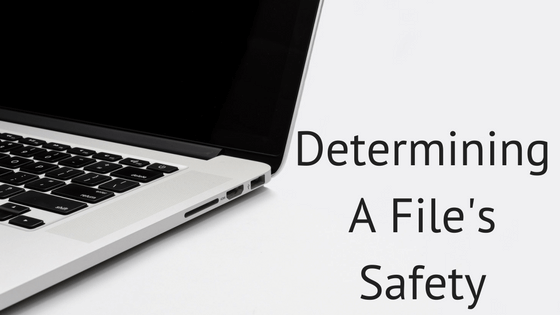Newer users to the Internet, both young and old, often fall prey to scams that infect their computer with a virus. This can be caused by inserting a physical object (such as a disk or a USB) into the computer, but more often it is caused by downloading a malicious file online. Although many of us are well aware and used to the tricks of the web, I realize that there are still many individuals succumbing to these attacks every day. Today, I plan to explain the ins-and-outs of how to tell whether or not a file is safe for you to download.
The Source
Where you download a file from is one of the biggest indicators of its safety. Was it emailed to you by a supposed coworker whom you’ve never met? Or, was it pulled from a trusted website? Unfortunately, both of these files could contain a virus, but the first scenario is more likely to be a cyberattack. Before downloading anything via email, double-check the sender’s address and make sure you know who the person is. If you don’t recognize their name, it is most likely either an accident, or it is a virus. When downloading files from a site, try to stick to sites beginning with https:// and not http://. The “s” signifies an extra level of security. However, many sites with http:// are safe. This ultimately comes down to your discretion, but when in doubt, do not download.
The File Itself
Looking to find a free antivirus software online, just in case you do accidentally download a virus? Don’t fall for it. Your computer likely already has virus protection on it, but if it doesn’t, you should always stick to a paid software that you can buy in any major retailer. Free antivirus software is a huge scam that actually plants viruses in your hardware. Sometimes, these viruses are seriously damaging, to the point where your computer needs to be factory reset. As in the point above, when in doubt, do not download.
Another quick point to mention is with downloading movies, TV shows, or music. The best advice I can give you is not to do it. These files almost always come with viruses attached, and if you are caught having downloaded this material, you can end up in jail. It is not worth the legal trouble and headaches, so avoid downloading anything you could easily pay $5 for on a legitimate site.
Google Results
If you are pretty sure a file is safe, but you want others’ opinions, take to Google. Type in “is [software/file name] safe?” and you will find almost always find feedback from people who have tried it. I suggest reading about it on Reddit if possible, as the responses there are almost always the most thorough. If responses are mixed, stay away from the file, as the creator may have planted false positive reviews. You can easily use your judgement to determine whether or not the reviews are truthful.
While the Internet is a great place to connect with others and share your thoughts, it is also a place full of people looking to steal your personal information. Downloading files is the easiest way to have personal information stolen, so think your decision through well before downloading to ensure you are not a victim of a cyberattack.

